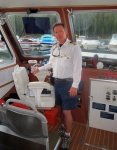stevej
New member
- Joined
- Nov 1, 2003
- Messages
- 314
- Reaction score
- 0
- C Dory Year
- 1995
- C Dory Model
- 25 Cruise Ship
- Hull Identification Number
- DOR25003K495
- Vessel Name
- Shearwater
After 23 years of working in IT for the same company looks like my job is going overseas (hello Bangalore) very soon and have this wonderful opportunity to change careers. While I am not able to retire (10 + years to go) I have no kids, mortgage or other payments so have a lot of freedom and can be flexible in my approach.
Been crewing on transports/deliveries in my spare time for the east coast yacht crowd off and on for the last 5 years so have exposure to the yachting industry and have made a number of contacts. This last week one of my contacts now in SAG harbor NY called and started a conversation about working with him next season doing booze cruises for the filthy rich (has 3 retaining offers on the table).
So in the next few months I will be moving forward with acquiring a 100 GRT Master license (will be limited to 25 GRT for now). Am looking for some input on methods to get licensed and to learn form others experiences.
Did you go the Coast Guard testing route or do it through a training center? Currently looking at Columbia Pacific Maritime here in Portland http://www.columbiapacificmaritime.com/index.html
I have study guides with sample tests and such to start the process
Reasonably proficient at Chart based navigation (comes naturally and is one of my strengths)
Have also attended a CG Aux class and have certs for that
Will hit Chapman’s hard covering rules of the road, markers, lights and such
Not overly concerned about getting the license as I’m pretty good at picking up information and testing but no reason not to solicit advice from those who have gone down this road already.
Any suggestions and or comments on the endeavor?
Thanks
stevej
Been crewing on transports/deliveries in my spare time for the east coast yacht crowd off and on for the last 5 years so have exposure to the yachting industry and have made a number of contacts. This last week one of my contacts now in SAG harbor NY called and started a conversation about working with him next season doing booze cruises for the filthy rich (has 3 retaining offers on the table).
So in the next few months I will be moving forward with acquiring a 100 GRT Master license (will be limited to 25 GRT for now). Am looking for some input on methods to get licensed and to learn form others experiences.
Did you go the Coast Guard testing route or do it through a training center? Currently looking at Columbia Pacific Maritime here in Portland http://www.columbiapacificmaritime.com/index.html
I have study guides with sample tests and such to start the process
Reasonably proficient at Chart based navigation (comes naturally and is one of my strengths)
Have also attended a CG Aux class and have certs for that
Will hit Chapman’s hard covering rules of the road, markers, lights and such
Not overly concerned about getting the license as I’m pretty good at picking up information and testing but no reason not to solicit advice from those who have gone down this road already.
Any suggestions and or comments on the endeavor?
Thanks
stevej

